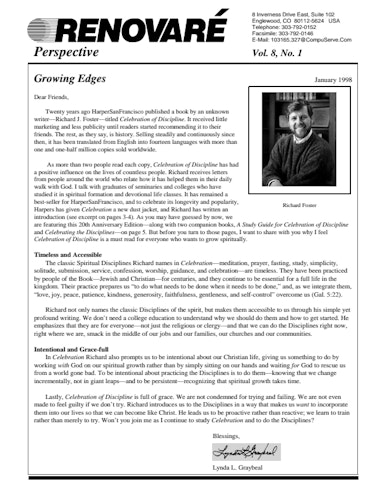Twenty years ago HarperSanFrancisco published a book by an unknown writer — Richard J. Foster — titled Celebration of Discipline. It received little marketing and less publicity until readers started recommending it to their friends. The rest, as they say, is history. Selling steadily and continuously since then, it has been translated from English into fourteen languages with more than one and one-half million copies sold worldwide.
As more than two people read each copy, Celebration of Discipline has had a positive influence on the lives of countless people. Richard receives letters from people around the world who relate how it has helped them in their daily walk with God. I talk with graduates of seminaries and colleges who have studied it in spiritual formation and devotional life classes. It has remained a best-seller for HarperSanFrancisco, and to celebrate its longevity and popularity, Harper has given Celebration a new dust jacket, and Richard has written an introduction (see excerpt on pages 3 – 4). As you may have guessed by now, we are featuring this 20th Anniversary Edition — along with two companion books, A Study Guide for Celebration of Discipline and Celebrating the Disciplines—on page 5. But before you turn to those pages, I want to share with you why I feel Celebration of Discipline is a must read for everyone who wants to grow spiritually.
Timeless and Accessible
The classic Spiritual Disciplines Richard names in Celebration—meditation, prayer, fasting, study, simplicity, solitude, submission, service, confession, worship, guidance, and celebration — are timeless. They have been practiced by people of the Book — Jewish and Christian — for centuries, and they continue to be essential for a full life in the kingdom. Their practice prepares us “to do what needs to be done when it needs to be done,” and, as we integrate them, “love, joy, peace, patience, kindness, generosity, faithfulness, gentleness, and self-control” overcome us (Gal. 5:22).
Richard not only names the classic Disciplines of the spirit, but makes them accessible to us through his simple yet profound writing. We don’t need a college education to understand why we should do them and how to get started. He emphasizes that they are for everyone — not just the religious or clergy — and that we can do the Disciplines right now, right where we are, smack in the middle of our jobs and our families, our churches and our communities.
Intentional and Grace-full
In Celebration Richard also prompts us to be intentional about our Christian life, giving us something to do by working with God on our spiritual growth rather than by simply sitting on our hands and waiting for God to rescue us from a world gone bad. To be intentional about practicing the Disciplines is to do them — knowing that we change incrementally, not in giant leaps — and to be persistent — recognizing that spiritual growth takes time.
Lastly, Celebration of Discipline is full of grace. We are not condemned for trying and failing. We are not even made to feel guilty if we don’t try. Richard introduces us to the Disciplines in a way that makes us want to incorporate them into our lives so that we can become like Christ. He leads us to be proactive rather than reactive; we learn to train rather than merely to try. Won’t you join me as I continue to study Celebration and to do the Disciplines?
Blessings,
Lynda L. Graybeal
Text First Published January 1998


